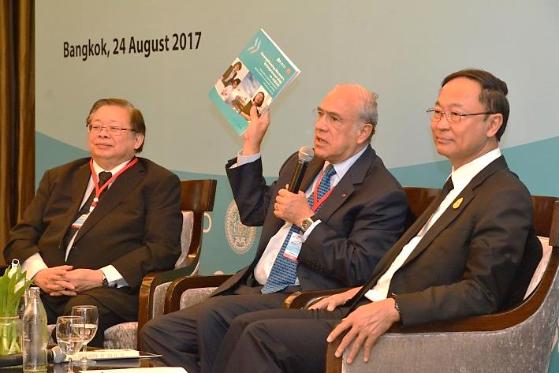Southeast Asia Gender Initiative
|
The OECD aims to promote gender equality in the global economy, including through gender-sensitive analysis and economic policy-making, to enable women to realise their potential as drivers of innovation, job creation, fair decision-making and economic growth. The OECD Southeast Asia Gender Initiative aims to support regional needs on strengthening gender equality in education, employment and entrepreneurship. |
||
|
The first Gender Initiative meeting was held in Jakarta on March 24, 2015, ahead of the Southeast Asia Programme Regional Forum.
About the Gender Initiative
OECD SG Gurría presented the Report at the 2017 OECD Southeast Asia Regional Forum in Bangkok |
 |
Social Institutions & Gender Index (SIGI) Women, Government and Policy Making in OECD countries: Fostering Diversity for Inclusive Growth
|
|
The OECD works on gender issues in areas such as education, employment, and entrepreneurship, as well as in cross-cutting topics such as women’s participation in public life, the underlying social, institutional and governance environment, and the development of statistics and data. Drawing on expertise from across the OECD, the Southeast Asia Regional Programme’s Gender Initiative has been developed to better understand the needs and existing work in the region, to help make choices about areas of comparative advantage, and to build partnerships over time and “look ahead” to future needs and opportunities. As part of this process, the OECD has and will continue to consult with regional groupings including ASEAN fora, Ministries in partner countries, and with specialist agencies such as UN Women and UNESCAP. Launched in 2017, “Strengthening Women’s Entrepreneurship in ASEAN” OECD report provides a comprehensive and up-to-date analysis of women’s participation in the labour market in Southeast Asia, with a focus on entrepreneurship. Developed in partnership with ASEAN, the Report offers an in-depth analysis of the status of women’s entrepreneurship as well as the related policy and programme landscape in all 10 ASEAN member states, and proposes measures to advance the role of women as entrepreneurs and business owners in the region. The OECD Development Centre’s SIGI also provides a cross-country measure of discriminatory social institutions, covering all countries of the region. The SIGI looks at how laws, attitudes and norms that discriminate against women and girls drive gender inequalities in education, employment and entrepreneurship, as well as having a negative impact on economic growth. The 2018 update is currently being prepared, with over 185 countries included, and strong engagement with the region is foreseen as part of the SIGI’s role as an official data source for the Sustainable Development Goal 5. While the Gender Initiative is horizontal and draws on expertise from across the OECD, the initial proposed areas of focus include: |
||
Related Documents




 Comparative regional data-gathering, analysis and recommendations on gender equality in public life in Southeast Asia, working in partnership with UNDP;
Comparative regional data-gathering, analysis and recommendations on gender equality in public life in Southeast Asia, working in partnership with UNDP;